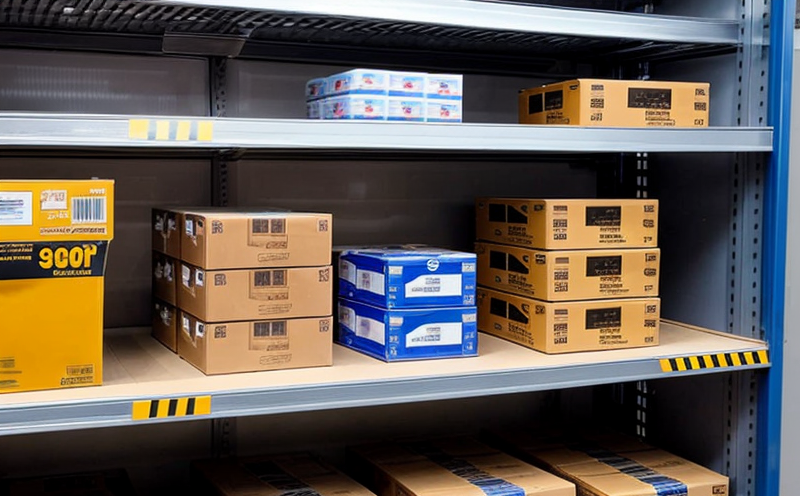ASTM F1980 Real-Time Shelf-Life Testing
The ASTM F1980 standard specifies a method to determine the shelf life of medical devices packaged in hermetically sealed containers. This real-time test involves monitoring the stability and integrity of packaging materials over time under defined storage conditions, which can vary based on the intended use environment of the device.
Understanding shelf life is critical for ensuring that medical devices remain effective and safe throughout their intended use cycle. By testing per ASTM F1980, manufacturers can gather comprehensive data to support product longevity claims and compliance with regulatory requirements such as those outlined in ISO 11607:2015.
The test protocol requires the packaging to be exposed to controlled temperature and humidity conditions for a specified duration. During this period, samples are periodically removed from the environmental chamber to assess any changes in physical properties or performance characteristics of both the package itself as well as the contents inside.
One key aspect of ASTM F1980 testing is that it simulates actual storage environments which could potentially shorten shelf life if not properly controlled. This includes high temperature and humidity conditions, cold storage, light exposure, etc., depending on the intended use environment specified by regulatory authorities like the FDA or European Union.
Another important factor to consider when performing ASTM F1980 testing is ensuring that the test specimens are representative of the final product. Proper sample preparation ensures accurate results and reliable data interpretation. This may involve cutting coupons from the packaging material, sealing them back into their original containers after testing, or even using actual device units for testing.
The primary goal of ASTM F1980 real-time shelf-life testing is to provide objective evidence supporting claims about how long a medical device can be stored safely and still function properly. The results from these tests help manufacturers make informed decisions regarding product labeling, storage instructions, and overall quality assurance programs.
- Provides comprehensive data on packaging integrity over time
- Supports compliance with international standards like ISO 11607:2015
- Helps ensure safe and effective medical devices throughout their shelf life
- Promotes accurate product labeling and storage instructions
- Aids in developing robust quality assurance programs
In addition to these benefits, real-time shelf-life testing also offers valuable insights into potential issues that might arise during prolonged storage. These could include delamination of multi-layered packages, moisture ingress leading to corrosion or degradation of internal components, or changes in coloration due to UV light exposure.
By identifying and addressing such problems early on through rigorous ASTM F1980 testing, manufacturers can significantly reduce the risk of recalls and product failures once a device reaches market. This ultimately leads to higher customer satisfaction and improved reputation for both the company producing the medical devices as well as those distributing them globally.
Why Choose This Test
The decision to perform ASTM F1980 real-time shelf-life testing is driven by the need for rigorous validation that ensures medical devices meet stringent quality and safety standards. By choosing this test, manufacturers demonstrate their commitment to producing reliable products that can be trusted in various storage conditions.
Additionally, compliance with international standards like ISO 11607:2015 adds credibility to a company’s reputation among healthcare professionals and patients alike. When selecting an independent laboratory for ASTM F1980 testing, it is essential to look for expertise within the field of medical device testing specifically.
A reputable lab will offer state-of-the-art facilities equipped with advanced equipment capable of simulating real-world storage environments accurately. They should also have experienced professionals who understand both the technical aspects of the test as well as its broader implications on product development and market entry strategies.
Finally, choosing a laboratory that offers additional services beyond just ASTM F1980 testing can provide further value to customers. For instance, many labs now offer accelerated aging tests which accelerate the natural aging process artificially using higher temperatures or humidities than would normally be encountered in storage conditions. Such services allow companies to identify potential weaknesses earlier on and address them proactively.
In summary, selecting ASTM F1980 real-time shelf-life testing as part of your quality assurance program demonstrates a proactive approach towards ensuring product safety and effectiveness while also supporting regulatory compliance efforts.
Customer Impact and Satisfaction
The implementation of ASTM F1980 real-time shelf-life testing has several positive impacts on customers. Most notably, it enhances customer trust by providing assurance that the medical devices they receive will function correctly and safely throughout their intended use cycle.
This trust translates into higher levels of satisfaction among healthcare providers who rely heavily on these products for patient care. It also benefits patients directly because it ensures that they are receiving reliable treatments without worrying about product failures or recalls later down the line.
From an operational perspective, manufacturers benefit from reduced costs associated with recall campaigns and product returns due to quality issues discovered after release into market. By identifying and resolving these problems early through rigorous ASTM F1980 testing, companies can improve efficiency within their supply chains while maintaining high standards of excellence.
In summary, implementing ASTM F1980 real-time shelf-life testing not only meets regulatory requirements but also contributes significantly to customer satisfaction and operational efficiency. It reinforces the overall quality assurance strategy of manufacturers committed to delivering safe and effective medical devices.





